Atlantis Japan Growth Fund Ltd (LON:AJG) is advised by Atlantis Investment Research Corporation (AIRC). Lead adviser Taeko Setaishi says that although consensus Japanese corporate earnings growth is being revised downwards, she is still able to identify primarily smaller-cap companies with promising growth prospects that are trading on attractive valuations. As an example, Setaishi highlights changing dynamics within the Japanese economy, which are generating growth in the widely diverse services sector. AJG’s portfolio is trading on higher valuation multiples than the TOPIX index but has meaningfully higher forecast earnings growth and a superior return on equity, which have contributed to the fund’s medium- and long-term outperformance versus the benchmark.
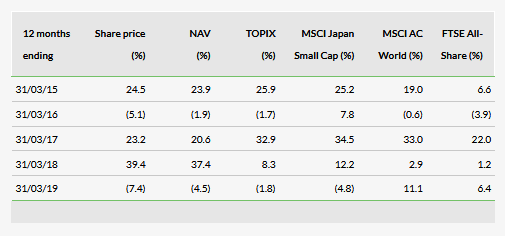

The market opportunity
While overall economic activity in Japan is muted, there are pockets of higher growth, both on a company-specific and sector basis; and in aggregate, Japanese corporates are increasing cash returns to shareholders via dividends and share repurchases. Meanwhile, Japanese equities look reasonably priced, both compared with other developed global markets and versus their own history.
Why consider investing in AJG?
■ Specialist fund offering exposure to higher-growth, often under-researched, companies in Japan.
■ AJG now has greater overlap with the highly rated open-ended Atlantis Japan Opportunities Fund, where Setaishi has been lead adviser since inception in 2003; the trust’s investment performance has improved since she became lead adviser on 1 May 2016.
■ Average annual NAV and share price total returns between 13.4% and 16.7% over the last three, five and 10 years.
■ Simplified capital structure following cancellation of the subscription rights programme in 2017.
Potential for narrower discount
AJG is currently trading at an 8.5% discount to NAV, which is broadly in line with the 8.8% to 9.5% average discounts over the last one, three, five and 10 years. There is potential for the discount to narrow if lead adviser Setaishi is able to build on her record of outperformance versus the benchmark, or if there is increased demand for Japanese, particularly smaller-cap, equities. Similar to the majority of its peers, AJG does not pay a dividend. Gearing up to 20% of NAV is permitted (net gearing of 2.9% at end-February 2019).
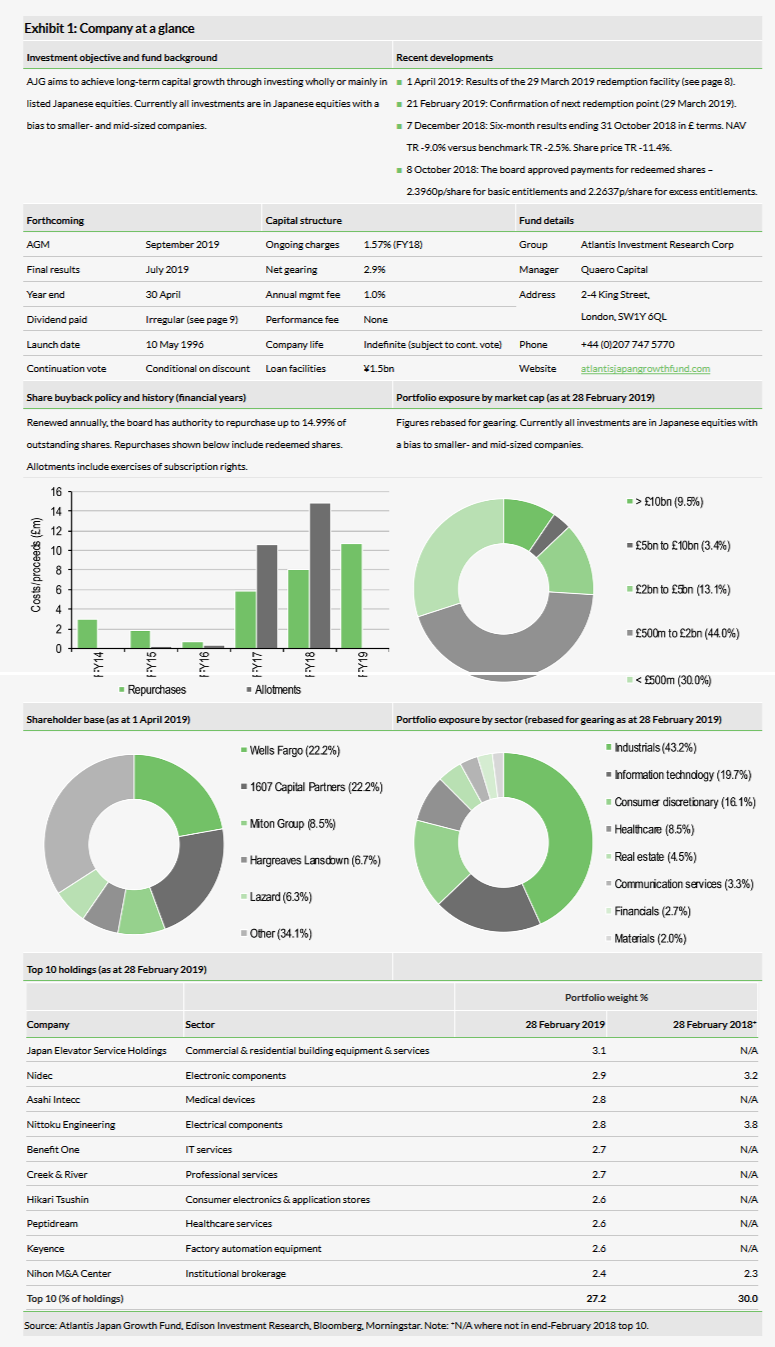
Market outlook: Valuation provides margin of safety
The lack of overall growth in the Japanese economy is well documented, as the nation struggles with a lack of inflation and an ageing population. Indeed, 2018 was affected by several natural disasters, and Q318 corporate profits fell at the sharpest rate since the period following the Fukushima earthquake and tsunami in 2011. The Japanese economy is also being negatively affected by the economic slowdown in China, which can be partially attributed to the escalating trade dispute with the US. However, there are Japanese companies, operating in niche businesses, that have attractive growth profiles, and in general, the corporate sector is utilising its cash flow more efficiently and returning capital to shareholders via higher dividends and share repurchases. There is potential for an improvement in the macro environment; the Chinese authorities are working to stimulate their domestic economy (measures include lower bank reserve requirements and reduced personal tax rates), and if the US president wishes to be considered for re-election in 2020, it is in his interests to ensure a robust economy and a buoyant US equity market, which may lead to a resolution in the trade dispute with China.
Exhibit 2 (LHS) shows that over the last five years, Japanese small-cap equities have outperformed the wider Japanese stock market, which has broadly kept pace with global equites. However, Japanese equities continue to look attractively valued (Exhibit 2, RHS), which provides a margin of safety in an uncertain macro environment. They are trading on a forward P/E multiple of 12.9x, which is an 11.6% discount to world equities, and this is noticeably wider than the 4.2% average discount over the last five years. Japanese equities are also trading on an earnings multiple that is 11% lower than its five-year average, unlike US and European equity indices, which are trading at premiums of 11% and 5% respectively.
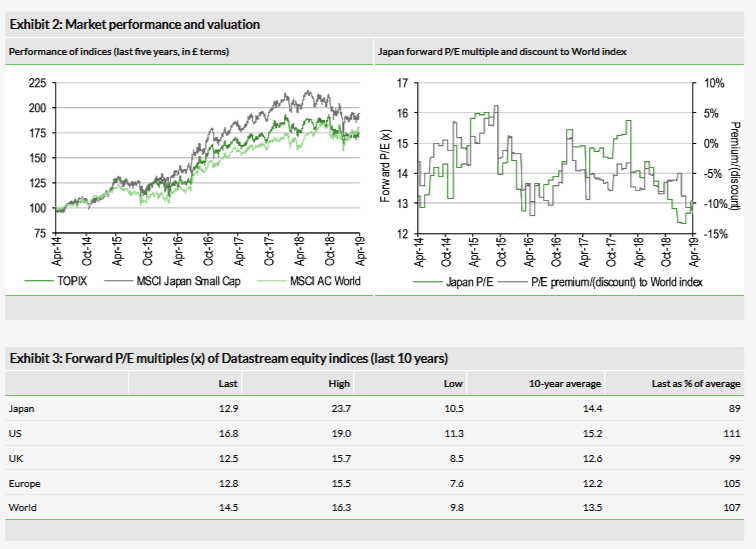
Fund profile: Smaller-cap Japanese equities
Launched on 10 May 1996, AJG is a Guernsey-registered investment company, listed on the Main Market of the London Stock Exchange. Its investment manager is Quaero Capital, with Atlantis Investment Research Corporation (AIRC) acting as investment adviser. AIRC is an independent boutique fund adviser based in Tokyo (established in 1996), employing four investment professionals (three portfolio advisers supported by an analyst) with an average of more than 30 years’ investment experience. Since 1 May 2016, AJG’s lead adviser has been Taeko Setaishi, who was formerly its deputy fund adviser for 20 years.
AJG aims to generate long-term capital growth from a diversified portfolio of 60–70 primarily small- and mid-cap Japanese equities, and is benchmarked against the TOPIX index. At the time of investment, a maximum 20% of NAV may be allocated to equity warrants or convertible debt (AJG’s current portfolio is entirely invested in publicly listed Japanese companies, including REITs, with no structured product exposure). No more than 10% of the portfolio may be held in a single company. Gearing up to 20% of NAV is permitted at the time of borrowing; at end-February 2019, net gearing was 2.9%. AJG does not typically hedge its currency exposure. Data from Northern Trust (NASDAQ:NTRS) and Bloomberg show that from the fund’s inception on 10 May 1996 to end-January 2019, AJG’s NAV total return in sterling terms was +229.9%, which is meaningfully ahead of the benchmark’s +48.1% total return.
The fund’s lead portfolio adviser: Taeko Setaishi
The lead adviser’s view: Pockets of growth opportunities
Setaishi says that over the last few weeks, there has been increasing evidence that the Japanese economy is slowing. She notes a deterioration in the export market, especially in terms of demand from China and South Korea, and the lack of a pick-up in consumer spending, making her more cautious on the overall Japanese growth outlook now than at the beginning of the year. However, she highlights that private sector capex remains robust as companies are investing in software and machinery to try to combat the effects of labour shortages, and capacity is being increased in anticipation of future demand. Japan’s consumption tax is scheduled to increase from 8% to 10% in October 2019. However, unlike in April 2014 when the tax increased from 5% to 8%, this time around, the government has committed to a ¥4.7tn stimulus package to offset the negative effects of the tax rise. Setaishi believes that the government is fully committed to the stimulus, with the bulk of spending due in the second half of Japan’s FY20 (ending 31 March 2020).
In terms of investor sentiment towards Japanese equities, the lead manager says that while February 2019 marked the seventh consecutive month of non-resident outflows on a cash basis, it was also the third month where there were net inflows on a futures basis (on a combined cash and futures basis, February 2019 saw net inflows into the Japanese market). Setaishi says that looking at domestic demand, Japanese equities will continue to be supported by Bank of Japan exchange-traded fund and pension fund purchases, while non-financial corporates are buying equities as part of their share repurchase plans (evidence of improving corporate governance in Japan). The lead adviser also notes a recent large uptick in short selling activity; however, the Japanese equity market has been able to absorb this without a noticeable decline in any key indices.
While in aggregate, the outlook for corporate profits growth has moderated for the coming Japanese financial year, Setaishi says that on an individual company basis, among both small- and large-cap companies, there are pockets of higher growth. While the lead adviser selects stocks purely on a bottom-up basis, there are a number of themes represented in AJG’s portfolio, such as demand growth in the healthcare sector resulting from Japan’s ageing population, along with the diverse services sector. The fund holds a number of companies in this area, including Tosoh, an operator of sports club facilities, hotels, and a golf course, which is a beneficiary of demand from Japan’s ageing population, as well as consulting services companies that are benefiting from labour shortages, such as Creek & River and Fullcast. Setaishi also highlights the infrastructure sector, where she has found several interesting investment opportunities. The adviser notes that rising industry capex is partly due to ageing infrastructure; she expects spending to remain robust as companies are experiencing demand for the decommissioning of old plants, which requires specialist resources. Setaishi reiterates that, although Japan’s economic growth could be described as ‘pedestrian’, there are many dynamic growth companies in the country, which are providing ‘good, exciting investment opportunities’.
Asset allocation
Investment process: Four-stage process
AIRC’s investment philosophy is that over the long term a company’s share price is driven by the level of its earnings growth. Stocks are selected on a bottom-up basis; the adviser seeks well managed companies with growing businesses and a strong competitive position, which are generating free cash flow and trading at a discount to their perceived intrinsic value. AIRC’s proprietary fundamental research can add meaningful value, particularly when identifying attractive small- and mid-cap companies, which tend to be under-researched by the wider market. As part of its research process, the team undertakes c 800 company meetings each year; this high level of interaction is viewed as an effective risk control.
There are four stages to AIRC’s investment process:
■ Periodic screening – the investible universe of c 2,000 companies is screened quarterly. Key criteria include: at least double-digit sales and operating profit growth; improving returns; and valuation multiples such as P/E to growth (PEG), EV/EBITDA and price-to-book (relative to the sector) are a focus.
■ Company visits – these are viewed as critical, to enable a good understanding of a company’s business model, its competitive position and future strategy.
■ Evaluation – diligent fundamental research, including construction of an earnings model to assess a company’s long-term sales and earnings growth potential, and determination of an appropriate valuation.
■ Buy list – typically c 125 companies considered for inclusion in the portfolio (c 40 are included on a watch list – companies with attractive fundamentals, but less compelling valuations).
Position size is a function of the adviser’s level of conviction in the investment thesis, as well as taking into consideration a stock’s liquidity. Holdings may be sold outright if there is an earnings disappointment; an unjustified change in a firm’s business model; a downturn in a company’s operating environment; or if a position becomes too large. The fund has a high active share of 97.6% (a measure of how a portfolio differs from the benchmark, with 100% representing no commonality and 0% full index replication).
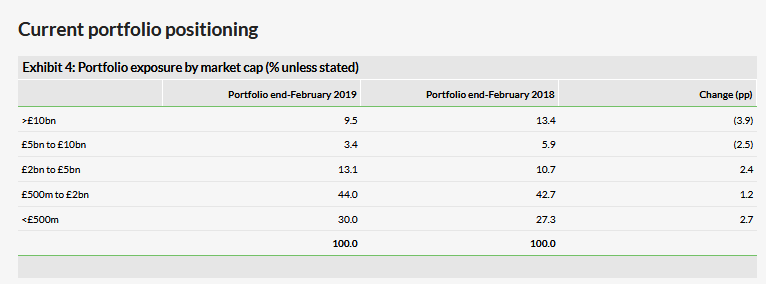
At end-February 2019, AJG held 64 stocks, four less than a year earlier. Looking at the portfolio’s top 10 concentration in Exhibit 1, it was 27.2% at end-February 2019, 2.8pp lower year-on-year (three positions were common to both periods). In terms of market cap (Exhibit 4), over the last 12 months, exposure to larger-cap companies (above £5bn) has declined by 6.4pp.
In Exhibit 5, we highlight AJG’s sector exposure (using Global Industry Classification Standard rather than TOPIX classifications). The largest changes year-on-year at end-February 2019 are consumer discretionary (+4.4pp) and industrials (-3.4pp). The largest active weights in sectors owned are industrials (+20.7pp), IT (+9.4pp) and financials (-8.2pp), while the fund has no exposure to the consumer staples, energy and utility sectors, which collectively make up 12.3% of the TOPIX index. Setaishi explains that over the last 12 months, the percentage of the portfolio invested in exporters (companies with more than 40% overseas sales) has declined from c 45% to c 30%, due to both selling and reducing positions, but also because of individual share price performance.
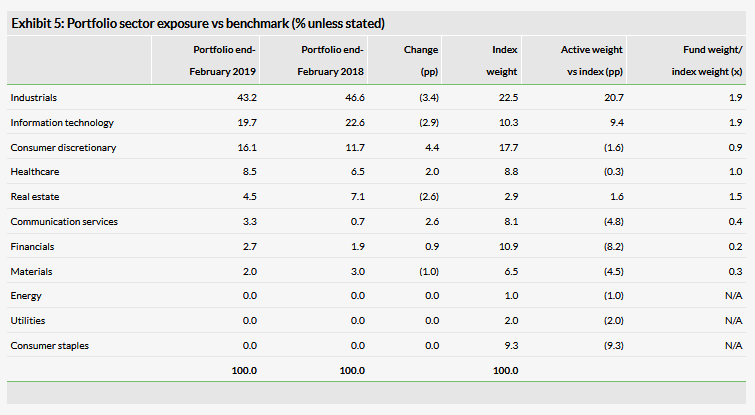
Setaishi highlights a few of AJG’s positions that have been initiated in the last 12 months:
Japan Elevator Service Holdings (JESH) – while industry growth is low at 1-2% pa, this company has annual sales growth in the high single-digits range, with mid- to high-teens percentage projected annual earnings growth. JESH provides maintenance services to the five main elevator companies in Japan, and is benefiting from market consolidation, as the management of smaller operators reach retirement age and are selling their businesses. The adviser says the company is well managed and sees clear potential for margin improvement.
Kyoritsu Maintenance – operates and manages business and resort hotels, as well as dormitories for students and young employees throughout Japan. The company is benefiting from increased demand for dormitories from universities and corporates that are struggling to attract or retain their staff in a tight labour market, as well as high hotel demand from Japan’s tourism sector.
TKP – a real estate company that is benefiting from the trend towards outsourcing, which is occurring at companies across the market cap spectrum. TKP provides meeting rooms that companies are able to rent by the hour, and also offers catering options. Setaishi says the firm has attractive growth attributes, with a high percentage of repeat business; she says that TKP’s break-even rate is very low (making money if only 15–20% of its available rooms are utilised).
Complete sales from AJG’s portfolio over the past year include Istyle and Star Mica. Istyle is an ecommerce company specialising in cosmetic products; the position was sold as its business was not recovering as rapidly as Setaishi had expected. Star Mica is a real estate company that had been held in AJG’s portfolio for a number of years. The adviser believed that the slowdown in new home sales in Japan would likely spread into Star Mica’s areas of operation, and some of its businesses have more ‘lumpy’ rather than steady growth, so she took the opportunity to realise profits on the holding.
Performance: Solid medium- and long-term returns
While AJG was not immune from the volatility in global stock markets during 2018, it has generated solid medium- and long-term returns for investors. Over three, five and 10 years, its NAV total return has ranged between 14.0–16.5% pa, while its share price total return has ranged between 13.4–16.7% pa (Exhibit 6, RHS).
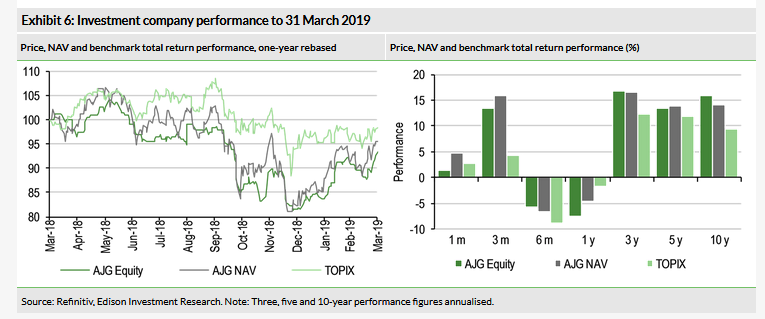
Looking at relative performance, AJG has outperformed its TOPIX benchmark index over three, five and particularly over 10 years in both NAV and share price total return terms, while lagging over the last 12 months (the figures in Exhibit 7 include AJG’s more than 10pp performance dilution from subscription share issuance from October 2015 to October 2017). For UK investors, it is interesting to note AJG’s significant outperformance versus the FTSE All-Share index over the last three, five and 10 years.
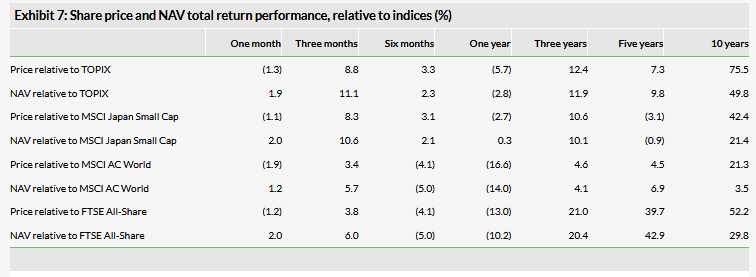
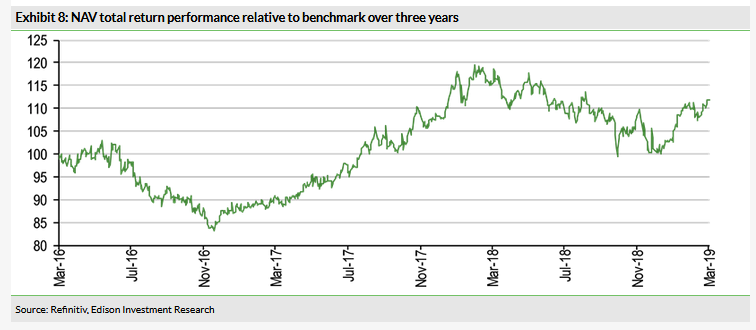
Setaishi explains that over the last year, the best contributors to AJG’s performance include construction firm Phil Company, outsourcing company Benefit One and Japan Elevator Service Holdings. Positions detracting from performance include Nittoku Engineering, Yamashin Filter and medical equipment company Cyberdyne. Commenting on the fund’s strong relative performance in February 2019, the lead adviser notes that small-cap stocks performed particularly well versus the broader market.
Discount: Broadly in line with historical averages
Having briefly traded at a premium in early 2018, AJG is currently trading at an 8.5% discount to NAV, which compares with the 3.3% to 14.6% range of discounts over the last 12 months. The current discount is broadly in line with the 9.2%, 8.9%, 8.8% and 9.5% average discounts over the last one, three, five and 10 years respectively.
The company adopted a hard discount control mechanism in 2013, whereby a continuation vote will be held if its shares have traded, on average, at a greater than 10% discount to NAV during any rolling 90-day period (in normal market conditions). If triggered, the vote will be held no later than the next practicable AGM. There is also a confirmed continuation vote at the October 2019 AGM. AJG has the authority, granted annually, to repurchase 14.99% of outstanding shares to help manage the discount; the most recent buyback was for 175k shares in December 2018.
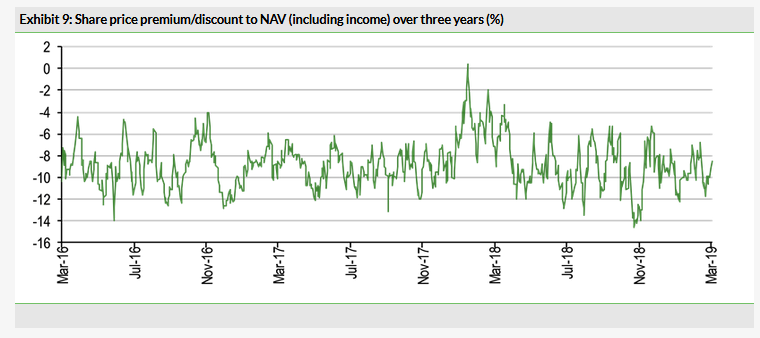
Capital structure and fees
AJG is a Guernsey-incorporated investment company with one class of share; there are currently 44.3m ordinary shares in issue. The company has a ¥1.5bn (c £10m) credit facility with Royal Bank of Scotland (LON:RBS) International, of which ¥1.0bn (c £7m) is drawn. At end-February 2019, net gearing was 2.9%. AJG’s subscription share mechanism was discontinued in November 2017, having successfully raised c £11m in FY16 and c £15m in FY17; the board believes the simplified capital structure is more appealing to shareholders. The company has a facility (at the board’s discretion), enabling shareholders to sell all or part of their holdings via a regular six-monthly redemption of up to 5% of AJG’s outstanding shares. At each redemption point, the board may notionally allocate assets and liabilities into a redemption pool or use available cash to fund redemption requests. On 28 March 2019, AJG announced that 3.8m (8.27% of the share base) had been lodged for redemption, which will be scaled back. Results were released on 1 April 2019; after offsetting excess redemptions, the trust’s share base was reduced by 1.8m shares (3.8%). AJG will be subject to a confirmed continuation vote at the October 2019 AGM.
AJG’s investment manager, Quaero Capital, is paid an annual management fee of 1% of NAV, and is entitled to the same rate on the NAV of any redemption pool; no performance fee is payable. In FY18, ongoing charges were 1.57% (FY17: 1.52%), which is meaningfully lower than 1.91% in FY16 – primarily due to the company’s larger size, spreading fixed costs over a larger asset base.
Dividend policy and record
AJG focuses on long-term capital growth rather than income. Its last dividend was immaterial and was distributed in FY12; the board intends to continue with a zero-dividend policy, as income tends to be offset by expenses. On an underlying basis, AJG’s portfolio yields 1.7%. This is lower than the 2.4% yield on the benchmark TOPIX index, which is unsurprising given the company’s focus on smaller-cap companies that are less likely to pay dividends.
Peer group comparison
AJG is a member of the AIC Japanese Smaller Companies sector. In Exhibit 10, we show the three closed-end funds in the sector that have been trading for more than a year. AJG’s NAV total returns are below the averages over the periods shown (only modestly below over one and three years); however, the company’s performance was diluted by more than 10pp over the two years of the subscription share issuance (October 2015 to October 2017). AJG has the highest ongoing charge of the three funds, the lowest level of gearing and is one of two peers that does not pay a dividend. To enable a broader comparison, we also show the six open-ended funds in the IA Japanese Smaller Companies sector that have been trading for more than one year. AJG’s total returns are above the open-ended averages over the last one and three years, while trailing over five and 10 years (readers should be reminded that Setaishi became lead adviser nearly three years ago).
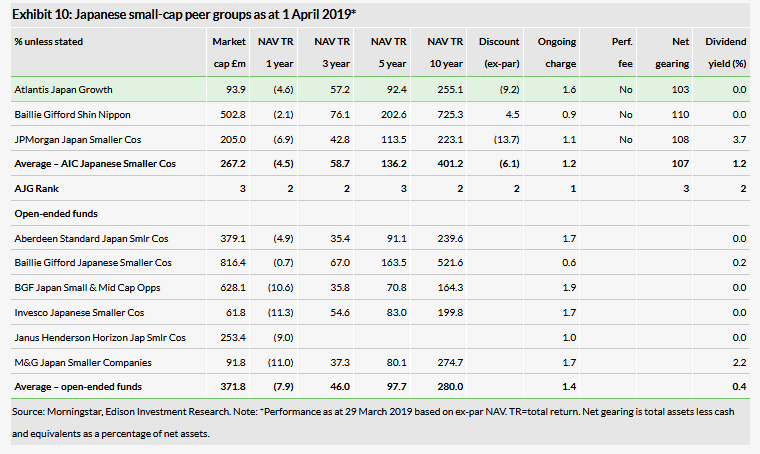
The board
AJG’s board comprises four independent non-executive directors. The chairman is Noel Lamb, who joined the board on 1 February 2011 and assumed his current role on 1 May 2014. Philip Ehrmann was appointed on 25 October 2013, Richard Pavry on 1 August 2016 and Michael Moule on 5 February 2018. The directors have backgrounds in investment trusts, fund management and the legal profession.